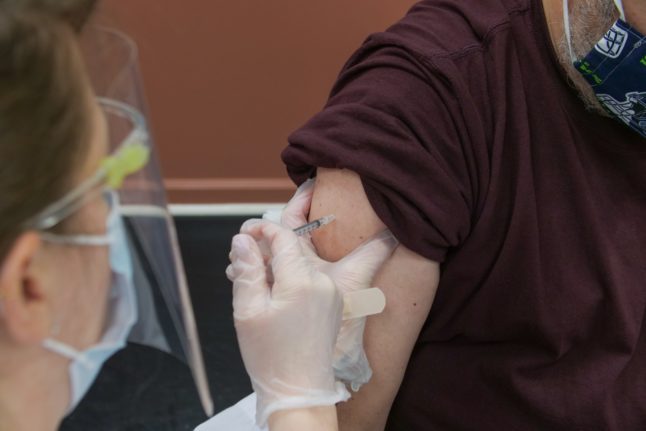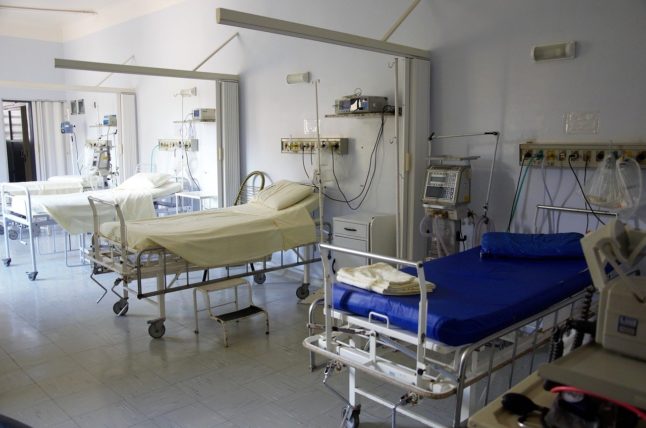In August, Switzerland’s drug regulator, Swissmedic, has approved a Moderna booster vaccine, which has demonstrated a “higher antibody concentrations against the Omicron variants” than the manufacturer’s original Covid vaccine.
READ MORE: BREAKING: Switzerland approves new Covid-19 boosters
“The revised Covid-19 vaccine recommendations come into effect on Monday, October 10th, 2022”, The Federal Office of Public Health (FOPH), said in a statement on Thursday.
It added that this booster “can contribute to reducing the number of severe cases and thus prevent the healthcare system from becoming overstretched in autumn and winter”.
That is all the more important as the number of reported infections “is currently increasing significantly” FOPH said.
Latest data shows that nearly 50 percent more cases were detected in Switzerland in the past seven days than at the same time in the previous week.
Who, according to health officials, should get this second booster?
FOPH and the Federal Commission for Vaccination (FCV) “recommend the booster primarily for persons at especially high risk and health professionals. However, the vaccine is also recommended for anyone aged over 16 years”, FOPH said.
Specifically, people aged over 65 years and those with chronic health conditions should have the shot, as “this group is at the highest risk of contracting severe forms of Covid”.
The recommendation also applies to those between 16 and 64 years without risk factors, but who work in acute and long-term care.
There is also a general recommendation for all other people aged between 16 and 64 years without risk factors.
“For them, getting a booster is sensible if they wish to reduce the risk of infection or a rare, severe form of the disease. Unlike at the start of the pandemic, however, people without risk factors are at low risk of contracting severe disease this autumn”, FOPH said.
Who should not get ‘boosted’?
Even though in January 2022, Switzerland approved Covid vaccines for youngsters from the age of five, the new one “is not recommended for children and adolescents aged between five and 15 years, as their risk of a severe form of COVID-19 is very low », FOPH said.
How is the new vaccine different from the previous one?
The previous vaccine, which has been administered in Switzerland since its rollout in January 2022, was effective against early strains, like Alpha and Delta, offering no immunity against Omicron or its sub-variants, which are currently responsible for all the coronavirus infections detected in Switzerland.
“Compared to the original vaccine, trials have shown that this [vaccine] produces a stronger immune response against the Omicron variants BA.1 and BA.4/5″, Swissmedic said, adding that the new vaccine remains as effective as its predecessor against the original Covid viruses.
The new vaccine is called ‘dual-strain’ precisely because it tackles both the original Covid virus and the newer Omicron variant.
Can this second booster protect you from catching Covid this autumn / winter?
Neither Moderna nor health officials give you this guarantee.
However, it can protect you from having a severe form of the disease — serious enough to end up in the hospital.
“A booster at least temporarily improves the individual protection against severe symptoms”, FOPH said, which is the reason why it is primarily recommended for people whose immunity systems are weakened, either by age or chronic diseases.
Is this new vaccine safe and what side effects can you expect?
Before approving this vaccine for the Swiss market, Swissmedic conducted “a careful review” of available data.
“They showed that the vaccine meets the safety, efficacy and quality requirements”, the agency said.
As for side effects, they are expected to be similar to those following administration of the second dose and the first the booster of the original vaccine: fever, muscle pains, and headaches.
Boosters will be free of charge to all residents of Switzerland. They are administered by cantons and appointments can be booked online through the cantonal sites.
READ MORE: Switzerland to start dual-strain Covid boosters in October



 Please whitelist us to continue reading.
Please whitelist us to continue reading.
Member comments